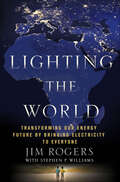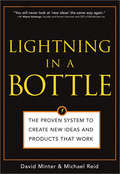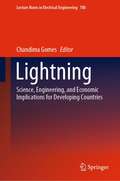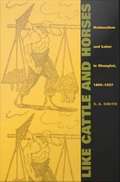- Table View
- List View
Lighting a Spark: Inspiring and Being Inspired by Others and Practicing the Art of Possibility
by Rosamund Stone Zander Benjamin ZanderIn the Middle Ages, when lighting a fire from scratch was an arduous process, people often carried a metal box containing a smoldering cinder, kept alight throughout the day with little bits of kindling. This meant that a man could light a fire with ease wherever he went, because he always carried the spark. But our universe, according to the authors, is alive with sparks. We have at our fingertips an infinite capacity to generate a spark of possibility for others to share, and this practice, the practice of enrollment, is the subject of this chapter. Enrollment is not about forcing or tricking someone into doing something your way--it is about tapping into the basic human urge to connect, express, and communicate through passionate energy. This chapter was originally published as Chapter 9 of "The Art of Possibility: Transforming Professional and Personal Life."
Lighting the Fire: Crafting and Delivering Broadly Inspiring Messages
by Tom Ryder Tsedal Neeleynote
Lighting the Way at the Manor House Hotel
by Samuel G. Hanson Joel L. Heilprin Charles AndersenCase
Lighting the World: Transforming Our Energy Future by Bringing Electricity to Everyone
by Jim Rogers Stephen P. WilliamsA former power company executive “makes his provocative case for powering up the Third World” (Discover).Without electricity, everything is harder. Imagine no cell phones, refrigerators, kitchen lights, or radios. Imagine having to finish all the day’s tasks—cooking, working, cleaning—before the sun goes down. Your children couldn’t do homework; you couldn’t read. It seems unthinkable today, yet this is how a staggering number of people on Earth still live. But Jim Rogers believes that can soon change—transforming not only people’s daily lives, but also their hopes for the future.In Lighting the World, Rogers describes how an international coalition can come together to secure financing, spearhead the newest and cleanest technologies, and work with the governments, entrepreneurs, and NGOs already on the ground to ensure that everyone has access to a steady and reliable supply of power. In today’s competitive world, Rogers believes, that shouldn’t be an accidental privilege, but a fundamental human right.Praise for Lighting the World“A passionate, but not ideological, argument that offers a practical approach to solving real problems.” —Kirkus Reviews“An enthusiastic account and a great starting point for readers curious about sustainable, worldwide electricity.” —Library Journal“In Lighting the World, Jim Rogers treats us to two books in one: a gripping journey around the dramatic world of energy for the poor combined with a fascinating account of what it takes to run and innovate a major U.S. utility.” —Dan Kammen, Professor of Energy, Energy and Resources Group & Goldman School of Public Policy, University of California
Lighting up the Blackbox — Digital Transformation in German Lobbying (Gabler Theses)
by Kathrin KuhnDigital transformation, alongside social media channels, influences policymaking. The aim of this research is to build knowledge of the consequences of digital transformation on lobbying at German federal level. This analysis uncovers how digital lobbying works in Germany and how it changes classic lobbying communication within the political sphere. Taking a grounded theory approach, the study addresses both communicating sides: lobbyists, on the one hand, and members of the German Bundestag and their employees, on the other. A profound understanding of, and differentiation between, lobbying and digital lobbying is gained through a first data-gathering step of 15 interviews with representatives of both the political and lobbying sides. The study extends previous analyses by supplementing the findings with ethnographic data from the researcher’s experience of working as an employee of a member of the German Bundestag. Final conclusions were drawn by presenting these results in the second data-gathering step, during four (digital) focus groups with the political side and three with agency, association, and corporate lobbyists from Berlin. The analysis uncovers a power shift in lobbying communication and a novel communication direction.
Lightning Discharges: Formation, Terminologies, Measurements and Theory (SpringerBriefs in Applied Sciences and Technology)
by Pitri Bhakta Adhikari Aashutosh AdhikariThis book highlights the basic information about lightning. It is an unpredictable disaster, and it is an extremely complex electrical discharge phenomenon. A complete theory of lightning does not exist till now. This book elaborates on the basic formation of lightning, terminologies related to lightning, and the preliminary lightning theory. There are different types of lightning, such as cloud flashes, ground flashes (both positive and negative), and air discharges. This book explains some unusual events related to lightning and inspects innovation. This book also describes the measurement of electric and magnetic fields generated by lightning, which are the basic parameters for lightning fundamentals.
Lightning Strategies for Innovation
by Willard I. ZangwillHow the World's Best Firms Create New Products.
Lightning in a Bottle: The Proven System to Create New Ideas and Products That Work
by David Minter Michael ReidLightning in a Bottle presents a simple seven-step system for creating ideas that work--one that improves new-product success rates from the standard one in 10 to one in two or better. Lightning in a Bottle also explains the top 10 reasons ideas fail, plus the dirty secrets of the research world, such as: -Why focus groups don't work for new products; -How market segmentation is often a sham; -Why brainstorming in not effective in creating great new products. In the tradition of Execution and Good to Great, Lightning in a Bottle is the new must-have guide for business leaders.
Lightning: Science, Engineering, and Economic Implications for Developing Countries (Lecture Notes in Electrical Engineering #780)
by Chandima GomesThis book highlights the essential theoretical and practical aspects of lightning, lightning protection, safety and education. Additionally, several auxiliary topics that are required to understand the core themes are also included. The main objective of the contents is to enlighten the scientists, researchers, engineers and social activists (including policy makers) in developing countries regarding the key information related to lightning and thunderstorms. A majority of developing countries are in tropics where the lightning characteristics are somewhat different from those in temperate regions. The housing structures and power/communication networks, and human behavioural patterns(that depends on socio-economic parameters) in these countries are also different from those in the developed world. As the existing books on similar themes address only those scenarios in developed countries, this book serves a vast spectrum of readership in developing world who seek knowledge in the principles of lightning and a practical guidance on lightning protection and safety education.
Lights Out!: Ten Myths About (and Real Solutions To) America's Energy Crisis
by Spencer Abraham William Guise TuckerIn this timely book, former Secretary of Energy Spencer Abraham debunks the myths that warp our current debate over energy, and offers new solutions to the real problems we face in America. Drawing on the very latest thinking from experts in industry and academia, and his own experiences running America's Energy Department, he proposes a fresh approach to meeting our daunting energy threats. This book effectively answers how America and the world can overcome the challenges of rising global energy demand, geopolitical disruptions of the energy marketplace, and the environmental impact of producing and using energy. What emerges is a pragmatic energy strategy that calls for blending a variety of energy sources including nuclear, clean coal, solar, wind, and natural gas with a more determined effort at improving energy efficiency through the deployment of smart energy grids and buildings, to help meet our challenges while preserving our economy and environment. Coming in the midst of a national debate about global warming, energy dependence and rising energy prices and rich with anecdotes from the author's service in the Senate and cabinet, this book is a clarion call that will help shape our energy future.
Lights Out: Pride, Delusion, and the Fall of General Electric
by Thomas Gryta Ted MannHow could General Electric—perhaps America&’s most iconic corporation—suffer such a swift and sudden fall from grace? This is the definitive history of General Electric&’s epic decline, as told by the two Wall Street Journal reporters who covered its fall. Since its founding in 1892, GE has been more than just a corporation. For generations, it was job security, a solidly safe investment, and an elite business education for top managers. GE electrified America, powering everything from lightbulbs to turbines, and became fully integrated into the American societal mindset as few companies ever had. And after two decades of leadership under legendary CEO Jack Welch, GE entered the twenty-first century as America&’s most valuable corporation. Yet, fewer than two decades later, the GE of old was gone. Lights Out examines how Welch&’s handpicked successor, Jeff Immelt, tried to fix flaws in Welch&’s profit machine, while stumbling headlong into mistakes of his own. In the end, GE&’s traditional win-at-all-costs driven culture seemed to lose its direction, which ultimately caused the company&’s decline on both a personal and organizational scale. Lights Out details how one of America&’s all-time great companies has been reduced to a cautionary tale for our times.
Lights Out: Ten Myths About (and Real Solutions to) America's Energy Crisis
by Spencer Abraham William G. TuckerIn this timely book, former Secretary of Energy Spencer Abraham debunks the myths that warp our current debate over energy, and offers new solutions to the real problems we face in America. Drawing on the very latest thinking from experts in industry and academia, and his own experiences running America's Energy Department, he proposes a fresh approach to meeting our daunting energy threats. This book effectively answers how America and the world can overcome the challenges of rising global energy demand, geopolitical disruptions of the energy marketplace, and the environmental impact of producing and using energy. What emerges is a pragmatic energy strategy that calls for blending a variety of energy sources including nuclear, clean coal, solar, wind, and natural gas with a more determined effort at improving energy efficiency through the deployment of smart energy grids and buildings, to help meet our challenges while preserving our economy and environment. Coming in the midst of a national debate about global warming, energy dependence and rising energy prices and rich with anecdotes from the author's service in the Senate and cabinet, this book is a clarion call that will help shape our energy future.
Lights Out? The Outlook for the Energy Sector in Eastern Europe and the Former Soviet Union
by World BankEmerging Europe and Central Asia, the region made up of the countries of Central and South East Europe (CSE) and the Commonwealth of Independent States (CIS), is a major energy supplier to both Eastern and Western Europe. However, the outlook for both primary and derivative energy supplies is questionable, with a real prospect that there will be a significant decline during the next two decades. Western Europe is heavily dependent on energy imports from this region and therefore will be affected by declines in primary energy supplies. But Western Europe has the financial capacity to secure the energy supplies it needs (albeit at the expense of others). In contrast, the region's energy-importing countries are caught between Western Europe, which has increasing import needs, and it's own exporters, whose exports will likely decline. These countries face the prospect of being squeezed not only financially but also in terms of energy access. This difficult prospect is compounded by the deterioration of the energy infrastructure, including power generation and district heating. Although the public sector will have to finance a portion of these infrastructure investments, it will not have the capacity to meet the full needs. It is essential, therefore, that the countries in the region move quickly to put in place an enabling environment to support investment in the sector. Further complicating these issues are environmental concerns, in particular concern about climate change. EU member states and those with EU ambitions will need to meet the challenging EU greenhouse gas emissions targets. At the same time, a number of countries in the region will face the temptation to use environmentally unfriendly technology to meet their immediate energy needs. 'Lights Out?' analyzes key measures that can help countries address all of these challenges.
Lights, Camera, Action: Media Coaching for Any Professional in Today's Digital World
by Amy ScruggsOn-camera insecurities and fears are common for many professionals and can keep them from growing their confidence and their business through the power of the media. Lights, Camera, Action gives practical advice and techniques to help achieve on-camera and communication skills to be a leader in today’s virtual world. After completing Lights, Camera, Action, readers will know how to deliver a concise message and be confident and ready for the various media platforms including Network TV interviews, podcasts and video marketing. They will also be ready to stand out in their virtual meetings with their introduction and messaging skills. Readers will be ready to utilize media opportunities for growth and visibility for their business of any industry.
Lightweight Enterprise Architectures
by Fenix TheuerkornThe author developed Lightweight Enterprise Architecture (LEA) to enable a quick alignment of technology to business strategy. LEA's simple and effective framework makes it useful to a wide audience of users throughout an enterprise, coordinating resources for business requirements and facilitating optimal adoption of technology. Lightweight Enterprise Architectures provides a methodology and philosophy that organizations can easily adopt, resulting in immediate value-add without the pitfalls of traditional architectural styles. This systematic approach uses the right balance of tools and techniques to help an enterprise successfully develop its architecture. The first section of the text focuses on how enterprises deploy architecture and how architecture is an evolving discipline. The second section introduces LEA, detailing a structure that supports architecture and benefits all stakeholders. The book concludes by explaining the approach needed to put the framework into practice, analyzing deployment issues and how the architecture is involved throughout the lifecycle of technology projects and systems. This innovative resource tool provides you with a simpler, easily executable architecture, the ability to embrace a complex environment, and a framework to measure and control technology at the enterprise level.
Like A House On Fire: ‘Brilliantly funny - I loved it' Beth O'Leary, author of The Flatshare
by Caroline Hulse'A joyously wicked read that will cheer you up no end. A genuine tonic. So clever, so funny and so refreshingly different. I loved it' RUTH JONES'Warm, witty & brilliantly realised' DAILY MAIL'Part Fleabag, part Agatha Christie' JOSIE SILVERTwo people trying to break up.One last family party.And no way out of it...* * * * *Things Stella and George have had blazing rows about:- Misquoting Jurassic Park.- Leaving a Coke can on the side of the bath.- Fitting car seats for their hypothetical kids.In other news, they're getting divorced.But first, Stella's mum is throwing a murder mystery party and - with her dad losing his job, her mum's recent diagnosis, and some very odd behaviour from her sister - now is not the time to tell everyone.All Stella and George have to do is make it through the day without their break-up being discovered - though it will soon turn out that having secrets runs in the family...* * * * *Praise for LIKE A HOUSE ON FIRE:'When it comes to personal relationships, Caroline Hulse dares to show us what we humans are really like. Her sparkling dialogue, astute observations and gloriously irreverent humour make Like A House On Fire a joyously wicked read that will cheer you up no end. A genuine tonic. So clever, so funny and so refreshingly different. I loved it' RUTH JONES'Acutely observed and brilliantly funny' CLARE MACKINTOSH'Funny and sad and relatable and deeply human' HARRIET TYCE'Part Fleabag, part Agatha Christie, Like A House On Fire is everything I love in a book...I was hooked from page one. Bravo, what a triumph!' JOSIE SILVER'Sheer delight from start to finish' LESLEY KARA'Painfully astute and brilliantly funny' BETH O'LEARY'Witty, whip-smart and wincingly observant, pure entertainment from start to finish. A Caroline Hulse book is a reading highlight of my year' CATHY BRAMLEY'Absolutely loved Like A House On Fire. A proper delight' RICHARD ROPER'Hilarious and brilliant and clever in that way only Caroline knows how to be. So compelling, I couldn't put it down' LUCY VINE'Caroline Hulse is a very funny writer and a wonderfully compassionate observer of human frailty' KATE EBERLEN'Funny, moving and astute. A triumph!' NICOLA MOSTYN
Like A House On Fire: ‘Brilliantly funny - I loved it' Beth O'Leary, author of The Flatshare
by Caroline Hulse'Joyously wicked... I loved it' RUTH JONES'Warm, witty & brilliantly realised' DAILY MAIL'Part Fleabag, part Agatha Christie' JOSIE SILVERALL STELLA AND GEORGE HAVE TO DO IS...Hide their breakupAfter a series of blazing rows about everything from Jurassic Park to installing car seats for their (hypothetical) children, Stella and George are getting divorced.Catch a murderer*But first, Stella's mum is throwing a murder mystery party - and with her dad losing his job and her mum's recent diagnosis, now is hardly the time to tell everyone.Make it through one last family partyStella and George just have to get through the day without their breakup being discovered - though it will soon turn out that keeping secrets runs in the family...*pretend murderer* * * * *Praise for LIKE A HOUSE ON FIRE:'When it comes to personal relationships, Caroline Hulse dares to show us what we humans are really like. Her sparkling dialogue, astute observations and gloriously irreverent humour make Like A House On Fire a joyously wicked read that will cheer you up no end. A genuine tonic. So clever, so funny and so refreshingly different. I loved it' RUTH JONES'Part Fleabag, part Agatha Christie, Like A House On Fire is everything I love in a book' JOSIE SILVER'Painfully astute and brilliantly funny' BETH O'LEARY'A deliciously dark comedy of manners' DAILY EXPRESS'Acutely observed... Very Nina Stibbe' CLARE MACKINTOSH'Funny and sad and relatable and deeply human' HARRIET TYCE
Like Cattle and Horses: Nationalism and Labor in Shanghai, 1895-1927
by S. A. SmithIn Like Cattle and Horses Steve Smith connects the rise of Chinese nationalism to the growth of a Chinese working class. Moving from the late nineteenth century, when foreign companies first set up factories on Chinese soil, to 1927, when the labor movement created by the Chinese Communist Party was crushed by Chiang Kai-shek, Smith uses a host of documents--journalistic accounts of strikes, memoirs by former activists, police records--to argue that a nationalist movement fueled by the effects of foreign imperialism had a far greater hold on working-class identity than did class consciousness. While the massive wave of labor protest in the 1920s was principally an expression of militant nationalism rather than of class consciousness, Smith argues, elements of a precarious class identity were in turn forged by the very discourse of nationalism. By linking work-related demands to the defense of the nation, anti-imperialist nationalism legitimized participation in strikes and sensitized workers to the fact that they were worthy of better treatment as Chinese citizens. Smith shows how the workers' refusal to be treated "like cattle and horses" (a phrase frequently used by workers to describe their condition) came from a new but powerfully felt sense of dignity. In short, nationalism enabled workers to interpret the anger they felt at their unjust treatment in the workplace in political terms and to create a link between their position as workers and their position as members of an oppressed nation. By focusing on the role of the working class, Like Cattle and Horses is one of very few studies that examines nationalism "from below," acknowledging the powerful agency of nonelite forces in promoting national identity. Like Cattle and Horses will interest historians of labor, modern China, and nationalism, as well as those engaged in the study of revolutions and revolt.
Like Family: Domestic workers in South African history and literature
by Ena JansenAn analytic and historical perspective of literary texts to understand the position of domestic workers in South AfricaMore than a million black South African women are domestic workers. Precariously situated between urban and rural areas, rich and poor, white and black, these women are at once intimately connected and at a distant remove from the families they serve. Ena Jansen shows that domestic worker relations in South Africa were shaped by the institution of slavery, establishing social hierarchies and patterns of behavior that persist today. To support her argument, Jansen examines the representation of domestic workers in a diverse range of texts in English and Afrikaans. Authors include André Brink, JM Coetzee, Imraan Coovadia, Nadine Gordimer, Elsa Joubert, Antjie Krog, Sindiwe Magona, Kopano Matlwa, Es'kia Mphahlele, Sisonke Msimang, Zukiswa Wanner and Zoë Wicomb. Like Family is an updated version of the award-winning Soos familie (2015) and the highly-acclaimed 2016 Dutch translation, Bijna familie.
Like My Stuff
by Natalie L. PetouhoffHow to Get 750 Million Members to Buy Your Products on Facebook
Like My Stuff: How to Get 750 Million Members to Buy Your Products on Facebook
by Natalie L PetouhoffFacebook is the largest, fastest growing and popular social media site in the world today. With more than half a billion members, it has been a major force in both the cultural and business area for years now, and has now changed everything with f-commerce. In this e-book, Social Media specialist Dr. Natalie Petouhoff explains how this powerful new feature works and provides strategies for businesses to boost their sales, promote their brands, and increase their online presence.Dr. Natalie helps companies understand how social media affects the bottom-line and to create strategies that provide real business value. As a USC Adjunct professor, Natalie takes her real-world experiences as a Forrester Social Media Analyst, an Agency executive and a consulting executive and translates it into practical business advice.
Like Nobody's Business: An Insider's Guide to How US University Finances Really Work
by Andrew C. ComrieHow do university finances really work? From flagship public research universities to small, private liberal arts colleges, there are few aspects of these institutions associated with more confusion, myths or lack of understanding than how they fund themselves and function in the business of higher education. Using simple, approachable explanations supported by clear illustrations, this book takes the reader on an engaging and enlightening tour of how the money flows. How does the university really pay for itself? Why do tuition and fees rise so fast? Why do universities lose money on research? Do most donations go to athletics? Grounded in hard data, original analyses, and the practical experience of a seasoned administrator, this book provides refreshingly clear answers and comprehensive insights for anyone on or off campus who is interested in the business of the university: how it earns its money, how it spends it, and how it all works.
Like She Owns the Place: Give Yourself the Gift of Confidence and Ignite Your Inner Magic
by Cara Alwill LeybaCan you imagine what life would be like if you could accept failure, cellulite, wrinkles, imperfection, screw-ups, and vulnerability? I’ll tell you what would happen: you would finally take that weight off your shoulders and build unshakeable, sustainable confidence. The truth is that confidence isn’t about living up to anyone’s expectations—it’s about affirming, every day, that you’re an effing boss. It’s not the result of being skinny, making a six figure salary, finding your dream partner, or drinking a green juice every day. It requires patience, dedication, forgiveness, bravery, and an incredible amount of self-compassion. You’ve probably read that “confidence is a choice,” and while that’s true, it’s more accurate to say that confidence is a series of repeated choices to accept yourself. To choose pride over insecurity. And to fearlessly show up in the world as the truest expression of yourself. It took me a long time to overcome all the BS. It took me a longer time to develop a rock-solid sense of inner-peace and become intimate with my intuition. To achieve real confidence that lasted longer than a sugar rush. My goal with this book is to share with you how I have arrived here, how I’ve helped my clients arrive here, and hopefully save you years of pain, shame, and uncertainty. Because, girl, I know how rocky this road can be. I’m going to show you how to block out all the noise around you, and how to free yourself from the opinions and judgment of others. I’m going to teach you how to trust your gut, reclaim your life, and rock what you’ve got. I’m going to show you how to own the place.
Like a Virgin: Secrets They won't Teach You at Business School
by Richard BransonIt’s business school, the Branson way. Whether you’re interested in starting your own business, improving your leadership skills, or simply looking for inspiration from one of the greatest entrepreneurs of our time, Richard Branson has the answers. Like a Virgin brings together some of his best advice, distilling the experiences and insights that have made him one of the world’s most recognized and respected business leaders. In his trademark thoughtful and encouraging voice, Branson shares his knowledge like a close friend. He’ll teach you how to be more innovative, how to lead by listening, how to enjoy your work, and much more. In hindsight, Branson is thankful he never went to business school. Had he conformed to the conventional dos and don’ts of starting a business, would there have been a Virgin Records? A Virgin Atlantic? So many of Branson’s achievements are due to his unyielding determination to break the rules and rewrite them himself. Here’s how he does it. .
Like, Comment, Share, Buy: The beginner's guide to marketing your business with video storytelling
by Jonathan CreekTake your video marketing to the next level with this practical and insightful resource Like, Comment, Share, Buy: The Beginner’s Guide to Marketing Your Business With Video Storytelling delivers powerful and actionable strategies to move your company’s brand to the forefront of your customers’ imaginations. Celebrated author, speaker, journalist, and consultant Jonathan Creek explains why video is the most impactful medium in which to market online and how you can leverage it for maximum benefit. Providing a fully interactive experience for readers through the book's video companion app, Like, Comment, Share, Buy contains an approachable and comprehensive method to unlock the power of online video and discusses topics like: How to make social media videos with just your smartphone The formula to creating contagious, compelling and viral content The scientific research underlying the author’s approaches to social media The tools and tips to marketing your small business on social media Perfect for social-media savvy entrepreneurs, small business owners, marketing managers, and advertising agents, Like, Comment, Share, Buy provides a compelling message that deserves to be heard by anyone hoping to increase their online and offline profile.




















